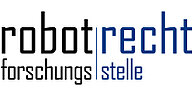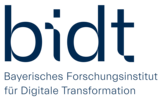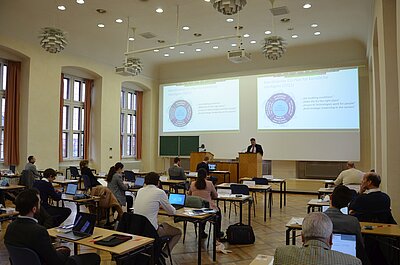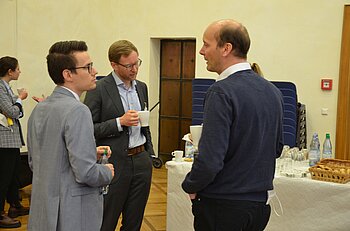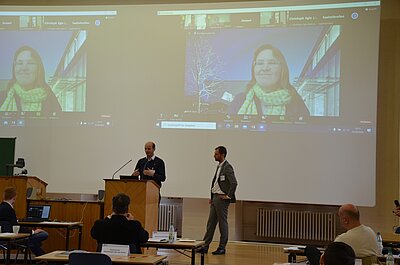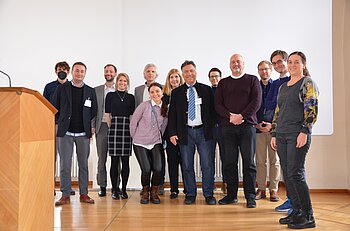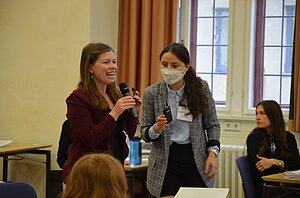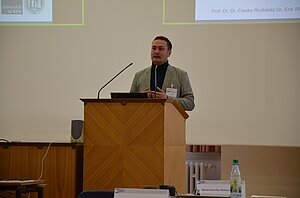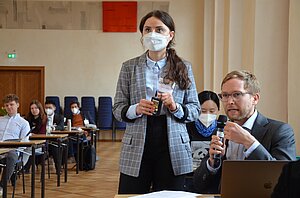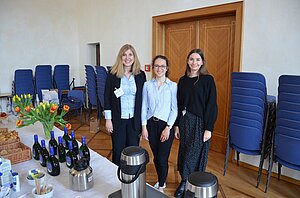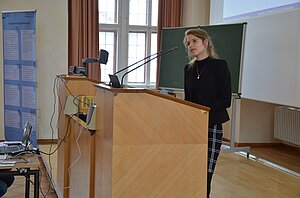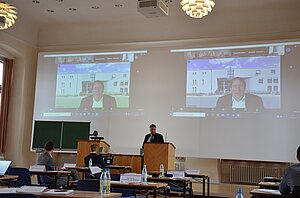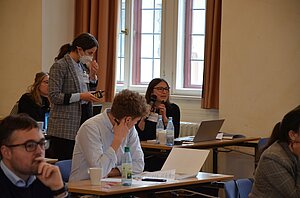Workshop about the EU regulation on Artificial Intelligence
The AI "GDPR": On the Need to Interpret the EU's Artificial Intelligence Regulation Proposal First
The General Data Protection Regulation - better known to all as the "GDPR" - has now become an issue of European significance. A similarly powerful, if not in the long term even politically more significant, transformation is now in store for us with the European Commission's proposed "AI Act" regulation for the area of "artificial intelligence".
Mankind has been dealing with artificial intelligence (AI) since the 1950s.
In the last twenty years, automated systems have made great strides and become part of our everyday lives. How to find a website on the Internet is not decided by a human, but by an algorithm. Gradually, fully automated cars will be driving on the streets of Germany. In people's homes, due to the rapid technological progress in researching AI-based models, there are already a large number of devices that make decisions based on algorithms and thus influence our lives. This can also happen in subtle ways, making it very difficult for most people to recognize AI in direct interaction.
The European Commission's proposed regulation on a law on AI represents the first legal framework for AI worldwide and has therefore generated a great deal of response. It is part of the digital strategy launched by the EU Commission since 2019, which provides for legal acts on digital markets, services, data, products and also AI. In these areas, it is no longer just about harmonizing European law, but creating new specific law that can respond to the "new areas of law" of the digital world.
The EU regulation on AI is currently still being prepared and thus offers a lot of room for interpretation and ultimately application in practice. But it is a proposed regulation that will impact our lives with a similar punch as the GDPR did at the time. This will initially be noticeable in the area of research and development of AI, but ultimately the effects of the so-called "AI Act" will be felt in every area of life. At the latest when it comes to whether desirable behavior (as in China) should be rewarded by a social scoring system in our society or not. The AI Act provides for a ban in this regard. Another exciting regulation is the use of real-time monitoring systems for law enforcement purposes. Whoever has the power of interpretation over the draft regulation in these problem areas can set a decisive course for the future.
The purpose of the workshop was to present individual key points of the draft regulation, starting with the basics of AI, and to work through them in a discussion.
Experts from science, politics and industry dedicated themselves to this task during the workshop at the Alte Universität in Würzburg on Friday, April 1, and Saturday, April 2, 2022, under the direction of Prof. Dr. Dr. Eric Hilgendorf as a member of the Bavarian AI Council appointed by the state government. The workshop was the first scientific event internationally to systematically review the EU Commission's draft.
The workshop also discussed critical issues in plenary session and looked at the AI Act from different perspectives. In addition, the areas that will be affected by this regulation in the future, such as medicine or the judiciary, were discussed. To this end, the speakers presented individual sections of the proposed regulation and provided key points for exciting discussions. While almost 60 people participated online, almost 40 people discussed the issues raised on site.
In his closing remarks, Prof. Dr. Dr. Eric Hilgendorf emphasized the importance of face-to-face meetings and stated that further conferences on the draft regulation or the "Data Act" will be necessary.
The results of the conference will be used for a conference handbook, which will be edited by Dr. David Roth-Isigkeit and Prof. Dr. Dr. Eric Hilgendorf. The handbook is expected to be published this fall. In terms of content, the group came to the conclusion that the EU's proposed regulation is currently still too vague and should be made more specific in many places.
If you have any questions about the Bavarian AI Council, you can contact Tamara Tomasevic, ki.rat(at)tum.de.
The Bavarian AI Council, together with the Würzburg Research Center RobotRecht, the Würzburg Center for the Social Implications of Artificial Intelligence (SOCAI), the Würzburg Center for Artificial Intelligence and Data Science (CAIDAS) and the Bavarian Research Institute for Digital Transformation (bidt), is organising a workshop on the new EU regulation on artificial intelligence on April 1st and 2nd at the "Alte Universität" in Würzburg and cordially invites all interested persons.
Artificial intelligence has been occupying mankind since the 1950s and in the last twenty years automated systems have made great progress and become part of our everyday life. The way a website is found on the internet is not decided by a human, but by an algorithm. Fully automated cars will gradually start driving on Germany's roads and there are already a large number of devices in people's homes which make algorithm-based decisions and thus have an influence on our lives.
The European Commission's proposal for a law on artificial intelligence represents the first legal framework for artificial intelligence worldwide and has therefore generated a great deal of interest. Beginning with the basics of artificial intelligence, the aim of the workshop is to present individual key points of the draft regulation and review these in a discussion.
The event will be held as hybrid. Participants on site are welcome. Please notify Nicolas.Kutschera(at)uni-wuerzburg.de of your intention to attend. Please note that 3G applies for presence participants. A zoom link will be provided on demand until March 31st .
Friday, April 1st
9.00 Opening remarks - Prof. Dr. Dr. Eric Hilgendorf and Dr. David Roth-Isigkeit
9.15 History and guiding values of the AI Regulation - Prof. Dr. Dr. Eric Hilgendorf, University of Würzburg
10.00 Technological Basics of AI - Prof. Dr. Andreas Hotho, Faculty of Computer Science, University of Würzburg
10.45 Break
11.00 Scope of application and AI definition of the AI Regulation - Prof. Dr. Sabine Gless, University of Basel / Prof. Dr. Ruth Janal, University of Bayreuth
11.45 Prohibited AI practices - Prof. Dr. Dr. Frauke Rostalski/ Dr. Erik Weiss, University of Cologne
12.30 Lunch break
14.00 High-risk AI systems: Risk-based approach - Prof. Dr. Mario Martini, German University of Administrative Sciences Speyer
14.45 Transparency requirements for high-risk and other AI systems - Jun.-Prof. Dr. Lea Kumkar, University of Trier
15.30 Break
15.45 National AI Regulatory Authorities and European AI Board - Dr. David Roth-Isigkeit, University of Würzburg
16.30 Legal sanctions - Dr. Carsten Kusche, University of Würzburg
17.15 End of first event day
Saturday, April 2nd
9.15 Innovation Support Measures - Jun.-Prof. Dr. Wiebke Voß, University of Würzburg
10.00 Liability under civil law - PD. Dr. Martin Zwickel, University of Würzburg
10.45 Quality control, corrective mechanisms and codes of conduct - PD. Dr. Dimitrios Linardatos, University of Mannheim
11.30 Break
11.45 Debate: Legislative perspectives and room for improvement
12.30 End of the conference
The Bavarian AI Council is an expert committee of the Bavarian State Government in the field of artificial intelligence (AI) and was established by:
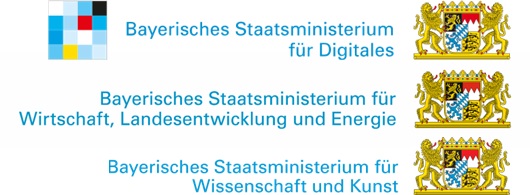
Affiliated partners
